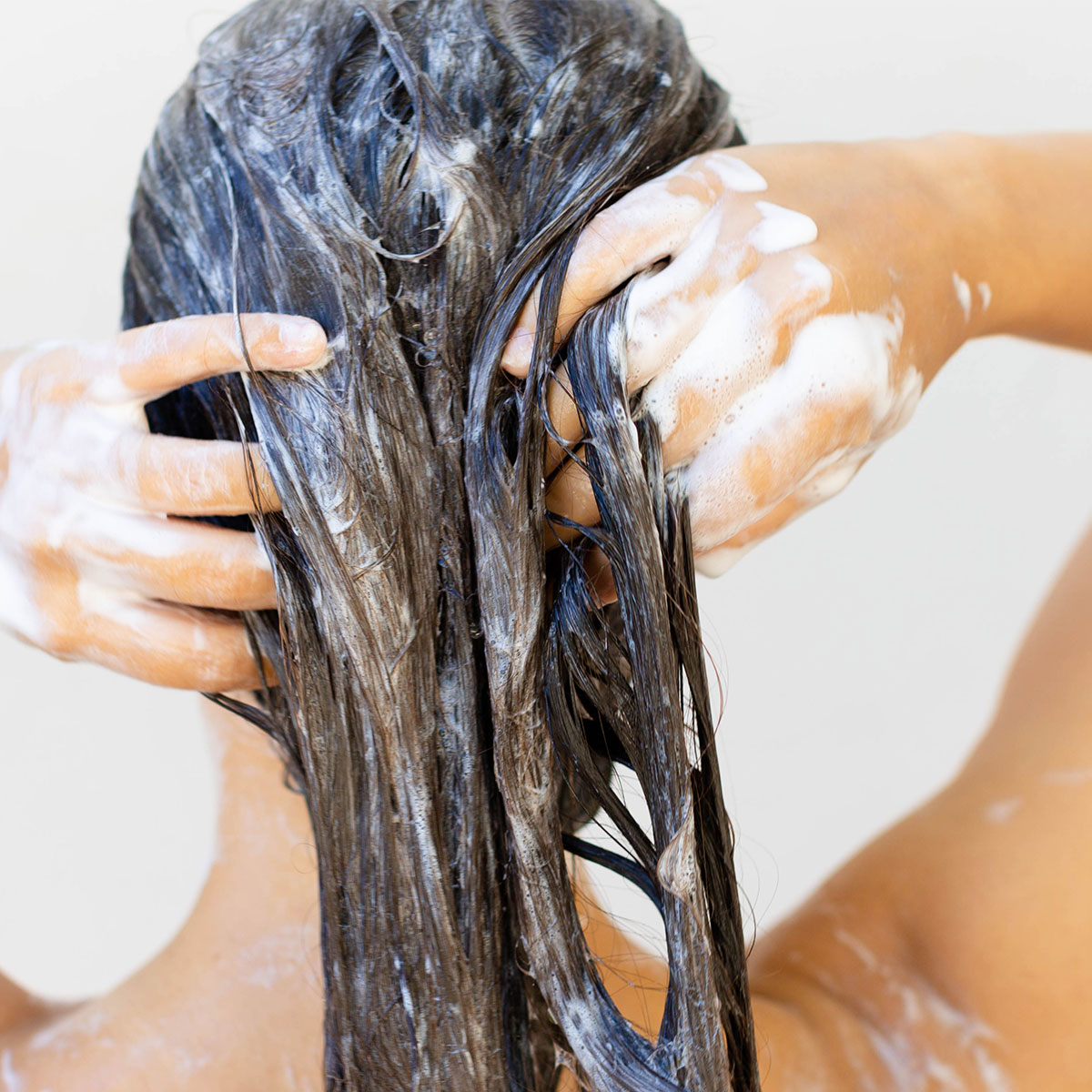
7 Shampoo & Conditioner Ingredients That Often Exacerbate Hair Loss And Thinning
1. Silicones
Silicones, commonly found in shampoos, are often portrayed as beneficial due to their ability to enhance shine and gloss. However, Factor stresses, their detrimental impact on scalp health should not be ignored as they can stifle its ability to receive necessary nourishment. "Silicones in shampoo can cause hair loss by coating the scalp so that nutrients cannot be absorbed," she warns.
2. Parabens
The presence of parabens in shampoos may lead to a host of hair-related issues, Factor tells us. These include "dryness and scalp irritation" as well as "fading hair color and hair loss." Since they are "generally unsafe," she says "it is best to avoid parabens until proven otherwise."
3. Sodium Chloride
According to Harth, sodium chloride, a frequent component of mass-produced shampoos, is not recommended for women who are experiencing hair loss or thinning. Commonly used to thicken shampoos and conditioners, it can "dry the scalp, causing redness and itching," Harth notes, and this scalp irritation can "damage hair follicles and cause more hair loss."
4. Sulfates
Having already thin, fine and delicate hair and adding harsh sulfate-based products can exacerbate or worsen hair loss, Udoh explains. “This harsh detergent, sodium lauryl sulfate [SLS] is a common ingredient in shampoos and conditioners and is known to strip away natural oils, leaving hair feeling dry, brittle, and damaged,” she says. This ingredient in conditioners can “also cause scalp irritation and hair loss.”
Will agrees, and adds that sulfates “are one of the most detrimental” ingredients that may be found in popular conditioners. “Surfactants such as sulfates are used to remove debris and excess oil from the scalp,” she reiterates. “They can make your hair frizzy and trigger an allergic response to your scalp. Furthermore, when used for lengthy periods of time, they can cause hormone disruption,” she adds.
5. Alcohol
When it comes to alcohol as a '"toxic" ingredient for fine, thinning and flat hair, Nichelle notes that this is often found in conditioners that advertise volume. "Volume conditioners often contain alcohol to help control or offset the heavier ingredients in a conditioner," she explains. Still, she notes that the cons outweigh the pros here.
"The short-term result may be more volume in your fine hair, but the alcohol dries and damages hair in the long term." She also points out that alcohol "cancels out the benefits of other ingredients in your conditioner."
6. Fragrances
A fragrance is another ingredient found in hair products like conditioner that can heavily irritate your scalp, Abdullah notes. "Fragrance is often not one ingredient, but a compendium of ingredients in low concentrations that the manufacturer doesn't want to list directly on the ingredients," she warns.
"Because there is very little government oversight with personal care products, 'fragrance' can be anything," she adds. "Fragrance doesn't cause dandruff per se, as it causes a wide range of allergies and dandruff can be one of them," she says, and an irritated scalp can lead to hair loss.
"With repeated use of hair products that contain fragrance, dandruff as an allergic reaction can worsen," Abdullah points out. Overproduction of oil can also be an allergic reaction, as can scalp acne. "Allergic reactions are the reason we now have so many fragrance-free products on the market," she adds, making products with this as an ingredient best to avoid for your scalp health, and if promoting hair growth is your goal.
7. Triethanolamine (TEA) and Diethanolamine (DEA)
Triethanolamine (TEA) and Diethanolamine (DEA) are used in shampoo and conditioners as foaming agents and emulsifiers. "DEA and TEA are believed to damage the keratin in the hair and irritate, contributing to more hair loss," Harth adds.
2 Healthier Shampoo & Conditioner Ingredients That Promote Hair Growth
1. Biotin
Biotin (aka vitamin B₇) is an important nutrient often found in foods like eggs, broccoli, bananas and milk. Many people take biotin as a supplement as they age, Abdullah explains, to strengthen their tresses. If also using a shampoo with biotin as a main ingredient, one can really reap the benefits of this vitamin in more ways than one. “Biotin is the ingredient to look for in shampoo if you want thicker, fuller, healthier hair,” Abdullah says.
Abdullah highlights the benefits of incorporating biotin-infused shampoo into one's hair care routine, which includes enhancing hair growth, relieving discomfort associated with itchy hair, and mitigating other hair conditions commonly experienced during the winter season. “Not only can it be taken as a supplement, but when used in shampoo the ingredient goes directly into the hair follicles.”
2. Saw Palmetto
Incorporating saw palmetto into your shampoo can prove to be advantageous in reducing hair loss, Hilton says, as it is a highly sought-after ingredient in the realm of hair care. "Saw palmetto is a natural extract from the berries of the Serenoa repens plant and has been used for centuries for the treatment of various conditions including hair loss," she explains.
Hilton adds that "saw palmetto works by blocking the production of DHT," which helps to "reduce hair shedding." Kung concurs, and points out that because saw palmetto is a DHT blocker, it is "helpful in the treatment of female pattern baldness that can become quite apparent when a woman is in her 40s."
The Bottom Line
Overall, Kung stresses that choosing the right shampoo for your hair is crucial as "shampoos are not only scalp cleaners, but indubitably act as preventing the hair shaft damage." Many scalp diseases are also "treated by active ingredients that are added to the shampoo's formulations," she says.
She concludes that "shampoos are typically composed of 10–30 ingredients, although products with as few as four ingredients are available."
While awaiting a doctor's recommendation for a tailored treatment for your hair and scalp, it is recommended to keep a lookout for products that contain biotin and saw palmetto, as suggested by our experts.


